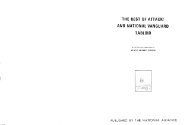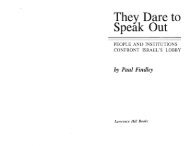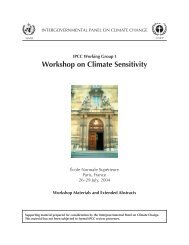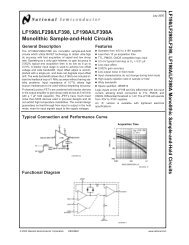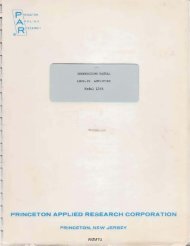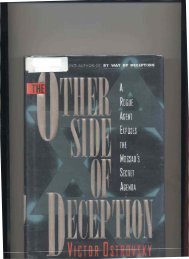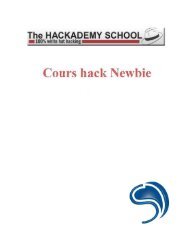Stands Among The World's Most Stands Among The ... - Index of
Stands Among The World's Most Stands Among The ... - Index of
Stands Among The World's Most Stands Among The ... - Index of
You also want an ePaper? Increase the reach of your titles
YUMPU automatically turns print PDFs into web optimized ePapers that Google loves.
etribution." - Anne O'Hare McCormick, New York Times, October 23rd 1946<br />
"<strong>The</strong> expulsion <strong>of</strong> the entire native population <strong>of</strong> eastern Germany by the puppet government <strong>of</strong><br />
Poland is a crime against humanity for which retribution must be made."<br />
<strong>The</strong> Houston Chronicle, March 28th 1947<br />
"<strong>The</strong> most inhuman decision ever made by governments."<br />
Anne O'Hare McCormick, <strong>The</strong> New York Times, November 13th 1946<br />
THE BRITISH FOREIGN SECRETARY<br />
<strong>The</strong> British Foreign Secretary, Ernest Bevin, who witnessed the sight <strong>of</strong> the expellees, reacted with<br />
horror and reported to the House <strong>of</strong> Commons. "It was a pathetic sight - the stream <strong>of</strong> perambulators<br />
and small vehicles <strong>of</strong> one kind or another, and the people were nearly all women and children, with<br />
very few men at all. Once could not help saying, 'My God! This is the price <strong>of</strong> stupidity and war. It<br />
was the most awful sight one could see."<br />
RICHARD STRAUSS! CLEAR OUT BY MORNING<br />
Richard Strauss, the last <strong>of</strong> the great classical composers, eighty-one years <strong>of</strong> age, had retired to his<br />
beloved home in Garmisch, awakened to find nailed to his door a notice posted by an American<br />
soldier: : 'Clear out by morning!'<br />
ANTON WEBERN, SHOT DOWN IN COLD BLOOD<br />
Anton Webern, the Austrian classical composer, contemporary and pupil <strong>of</strong> Arnold Schoenberg, then<br />
aged sixty-two years <strong>of</strong> age, was shot dead by an American G.I whilst visiting his daughters near<br />
Salzburg on 15th, September, 1945 - over five months after the war had ended.<br />
He had, before his death, buried most <strong>of</strong> his valued possessions, compositions and manuscripts in the<br />
garden <strong>of</strong> his Viennese home.<br />
"<strong>The</strong>se remained unharmed when the invading soldiers took over the abandoned house, but they<br />
inflicted senseless damage on what remained in sight. Scores, books, and correspondence were<br />
strewn about the yard; Webern's cello was kicked in; his personal papers were used for kindling."<br />
Jonathan D. Kramer, Listening to Music<br />
BRITISH PRESS REPORTS OF THE PERIOD FOLLOWING THE WAR'S END<br />
"Each day between fifty and one-hundred children, a total <strong>of</strong> over 5,000 already over a short period -<br />
who have lost both their parents, or have been abandoned, are collected from Berlin's stations and<br />
taken to orphanages or found foster mothers in Berlin."<br />
"Of eighty-three persons (women and children) crammed into two <strong>of</strong> the trucks twenty were dead."<br />
Berlin Correspondent, <strong>The</strong> Times, September, 10th, 1945<br />
"Three orphans I saw aged between eight and twelve are still almost skeletons after ten days<br />
treatment... none <strong>of</strong> them weighed more than three stone. Another small boy turned out <strong>of</strong> Danzig<br />
had a scrawled postcard attached to him stating that his soldier father was long since missing and that<br />
his mother and two sisters had died <strong>of</strong> hunger." - Berlin Correspondent, <strong>The</strong> Times, September 10th<br />
1945<br />
146




